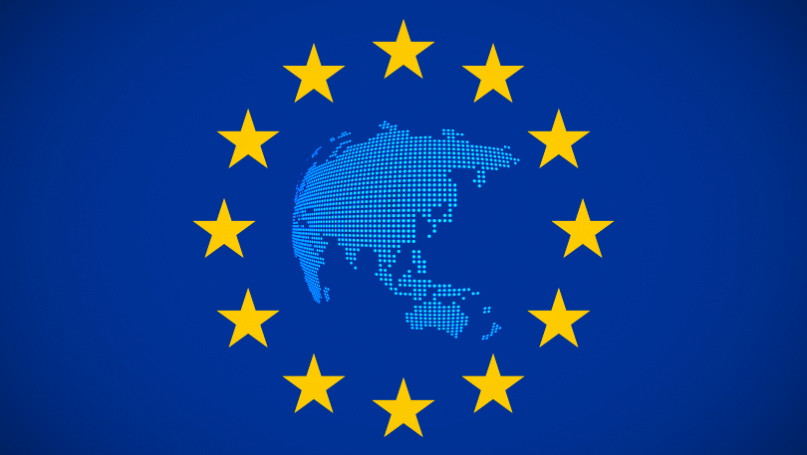Shreya Sinha

At a time when the Indo-Pacific narrative is getting well-established across the globe amidst great conflict of military tensions and civil unrest, the European Union has also released its own strategy towards it. Given that the region has been ignored by the supranational Union for decades, there are several factors as to why the EU chose to act on constructively associating itself with the Indo-Pacific now. The reasons for this move include pressures from its Member States namely France, Germany and Netherlands. Further, the need to counter China’s revisionist challenge and its politico-economic rise along with the quest of the EU to establish itself as a relevant geopolitical actor to realize its global power aspirations remain primary triggers.
The geopolitics of the Indo-Pacific is at its highest developed stage in history, contributing to nearly 60% of the global GDP and being home to three of the four largest economies outside of the EU (India, China, Japan). Owing to its geographical reality, the region is central to global value chains, international trade and investment flows and is also at the forefront of digital economy. The Strategy launched in April 2021 recommits the EU politically to the region with the aim of “contributing to its stability, security, prosperity and sustainable development, based on the promotion of democracy, rule of law, human rights and international law”. Through its said commitments, the EU realizes the need to build upon its existing relationships with multiple regional players, India, Japan and South Korea, given the international air of mutual distrust and competition.
The Indo-Pacific is home to a number of rising tensions, geostrategic rivalries and contested territories given the region of South China Sea passes through it. The Strategy will allow the EU to engage productively with such border issues and enhance cooperation in many areas including ocean governance and intensifying cooperation in multilateral fora. Given the normativeness of power the Union brings to the table, it would attempt to create an order in the region such that the regional architecture remains open and rules-based. The Union strives to protect the critical maritime routes through capacity building and improving the maritime domain awareness of the countries. Further, as human rights challenges in the Indo-Pacific also increasingly threaten the security and stability of the region, it directly affects EU’s interests, making it an active stakeholder.
It is important to note that the Strategy comes at a time of unprecedented rise of China at the global scale. It puts the Union at loggerheads with China as Beijing continues to threaten the security of the area by claiming indisputable sovereignty over the Nine-Dash Line in the South China Sea. Historically viewing Europe-China relations indicate numerous instances when the EU and China have found themselves at loggerheads. Moreover, in recent years in particular, the EU has not only been apprehensive of the Chinese provocation of European countries pushing them towards adopting a ‘One-China’ Policy’ with no exception, but also of China’s assault on Hong Kong’s independence as well as China’s assertion of a wolf warrior diplomacy across its foreign policy.
For decades, the EU-China relationship has been one that lacks a shared vision and a common goal. The European ideals of liberal democracy, human rights, persuasion over coercion for resolving conflicts etc. don’t find any takers in China. China can be said to be antithetical of what today’s Europe stands for. Europe being a normative power is testimony to it being an ideational actor characterised by common principles and norms within its international relations. China, on the contrary, despite being a signatory to international human rights charters has continually been promoting alternative and flexible concepts of human rights that are more suitable to autocracy rather than liberty, as has been evident in China’s conduct and denial of human rights towards Tibet and Uyghur Muslims.
The EU’s perception of China as a “systemic rival promoting alternative models of governance” has been outlined in the European Commission’s report on EU-China: A Strategic Outlook (March 2019). This is majorly fuelled by not only China’s alarming nationalist narrative highlighted at the forefront vis-a-vis the global health crisis, but also due to Beijing’s growing support towards the populist parties on Europe and Europe’s frustrated inabilities to access the Chinese markets. The Strategy enables the EU to leverage its economic weight in the region through application of high-standards in free trade agreements and policies. Thus, the involvement of the Union in the Indo-Pacific comes at a time of collective pushback against China at the global level.
With the re-strengthening of the Quad or the Quadrilateral Security Dialogue (USA, Japan, Australia, India) and cohesive engagement by regional players, Indo-Pacific is the new geopolitical construct, which cannot be ignored and discredited by the major players in the international community. A well-drawn-up strategy needs to be coupled with robust implementation to emerge as an effective device of change. While the coming of the EU’s Indo-Pacific Strategy gives it a ticket to a realm and access to a region which is defining the current global order, it is imperative for it to not succumb into irrelevance by becoming a toothless tiger in order to eventually lead to the actualisation of the EU as a truly strategic global geopolitical actor.
No comments:
Post a Comment